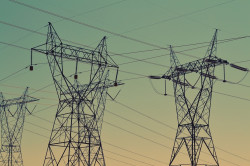“Democratic” supergrids
Thousands of kilometres of increasingly sophisticated and cutting-edge transmission lines, in other words supergrids, are on the EU agenda. Projects for high voltage links between countries are already being implemented. But works are often blocked or slowed down because of opposition locally. In general, the public have concerns relating to the impact on their health, environmental damage and loss in property value. These fears are, in most cases, fuelled by what’s perceived to be poor consultation and communication about the positive effects of new electric lines, such as improved energy security and less emissions. There are well-known cases of opposition. Building the Spain-France electrical interconnection across the Pyrenees took more than 20 years and the direct intervention of the former European commissioner Mario Monti as a special advisor, all because of citizens’ resistance to new power lines through the mountains. Another case is the SuedLink transmission line, needed to transport more electricity from the north to the south of Germany. Due to opposition, particularly in Bavaria, the country has adopted a new law that obliges transmission operators to give priority to underground cabling, in a bid to boost public acceptance. This means the SuedLink will be the first project of its size, over 800 kilometres, which will be predominantly buried. The European TEN-E Regulation (2013) addresses these issues. “Indeed, the EU sets a framework for ‘projects of common interest’, which includes many rules on how to better inform the public. The obligations range from having a dedicated project website to developing a strategy for public participation and organising at least one public consultation before the official permitting procedure,” expert Antonella Battaglini tells youris.com. Battaglini collaborated with the BESTGRID project, which aimed to promote public participation in grid development processes: “We could see, from working together on several levels, it really made a difference. This ranged from European exchanges between consortium partners to cooperation between local NGO groups and grid operators.” In Italy, the modernisation of the SACOI (Sardinia-Corsica-Italy) link is underway. It is a strategic cable at the centre of the European project BEST PATHS. “We are starting a series of consultations with the local institutions and communities involved to promote as much as possible the technologies that are most sustainable for the environment and the community”, says Terna, which runs national high voltage grids in the country and is part of the project. The definition of “projects of common interest” relates to projects that contribute to the integration of electric energy markets in the EU, improve the security of energy supply, increase production from renewable energy sources and reduce CO2 emissions. The Agency for the Cooperation of Energy Regulators (ACER) states that 31 percent of the projects of common interest are delayed, while 14 percent are being re-worked. The main reasons are national law changes, uncertainty of regulatory decisions and public protests. “The common (‘public’) interest is already defined at the planning level, where the public does not have sufficient possibilities to participate,” writes environmental lawyer Birgit Schmidhuber, who led a legal analysis on the TEN-E Regulation. “Then at the project level mostly no criticism is tolerated, as the overall decision has been taken before. The public – at least the affected public – should have the possibility to raise interests which are notoriously under-represented (…) such as environmental or health concerns.” Read more: http://www.youris.com/Energy/Energy-Grid/Democratic-Supergrids.kl
Keywords
grids, supergrids, smart grids, energy, renewables, transmission lines, social acceptance, regulatory framework
Countries
Germany, Spain, France, Italy



